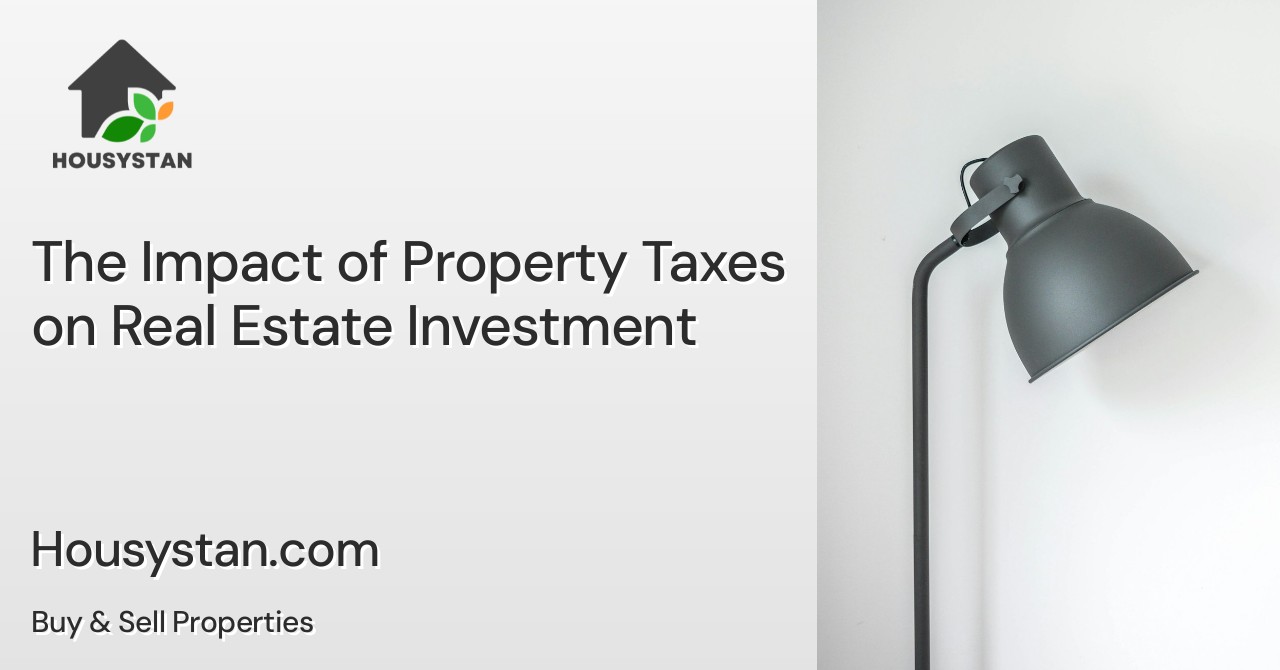The Impact of Property Taxes on Real Estate Investment
Read latest blogs and articles from Housystan

The Information mentioned here was last updated on:
29/1/2026The Impact of Property Taxes on Real Estate Investment
Investing in real estate is often seen as a smart way to grow wealth, but it's not without its complexities. One key factor that significantly impacts real estate investment is property taxes. These taxes are ever-present and vary considerably based on location, and they can influence everything from cash flow to overall investment returns. In this article, we’ll delve into the various aspects of property taxes and their influence on real estate investment to provide clarity for both seasoned investors and newcomers alike.
Understanding Property Taxes
- Verified Tenants/Buyers
- Unlimited Property Listing
- Zero subscription/charges fee
Property taxes are levied by local governments to fund public services such as schools, roads, and emergency services. The amount you pay is typically based on the assessed value of the property and the local tax rate.
- Assessed Value: This is the dollar value assigned to a property to calculate property taxes. The assessed value usually reflects a percentage of the property’s market value.
- Tax Rate: Often expressed as a percentage, the tax rate is determined by local governing bodies and can vary between different regions even within the same state.
Both of these components can change over time, influencing the amount of property taxes you pay and, consequently, your investment returns.
How Property Taxes Affect Real Estate Investment
1. Cash Flow Implications
Property taxes are a recurring expense that can impact your property's cash flow significantly. Here's how:
- Reduced Rental Income: Higher property taxes can decrease your net rental income, affecting your cap rate and return on investment.
- Budget Planning: Investors must account for property taxes when setting rental prices and forecasting returns, ensuring the property remains profitable.
2. Property Value Considerations
The level of property taxes in an area can directly influence property values.
- High Taxes, Potential Lower Demand: Areas with high property taxes may see a lower demand, which can lead to slower appreciation.
- Value vs. Tax Rate Analysis: Investors often perform a value vs. tax rate analysis to determine if an investment is feasible. Lower tax rates in emerging markets can attract investors looking for better appreciation potential.
Regional Variations in Property Taxes
Property taxes vary not only between states but also within different regions and even municipalities. Understanding these variations is crucial for making informed investment decisions.
- State Differences: States like New Jersey and Illinois have high property taxes, whereas others like Hawaii and Alabama are known for lower rates.
- Local Variations: Even within states, property taxes can fluctuate based on county and city policies. For instance, urban areas may have higher taxes than rural counterparts due to increased demand for public services.
Considering these factors is crucial during the property selection process as it directly impacts the overall cost of ownership.
Strategies to Mitigate High Property Taxes
Investors often seek ways to minimize the burden of property taxes to maximize their returns. Here are some strategies:
Conduct Thorough Research
- Historical Data Review: Examine historical property tax rates and trends in the area. This information can help predict future tax changes.
- Tax Appeal: If you believe the assessed value of your property is inaccurate, you can file an appeal. This can potentially lower your tax obligations if successful.
Strategic Investment Decisions
- Focus on Low-Tax Areas: Investing in areas with relatively low property taxes can increase overall profitability, especially in regions with strong growth prospects.
- Tax Incentives: Some areas offer tax incentives or reductions to stimulate growth and attract investment. These can provide significant savings over time.
The Role of Property Taxes in Location Selection
The location of a property plays a pivotal role in real estate investment decision-making, largely due to the implications of property taxes.
Analyzing Potential Returns
Investors must assess how property taxes will affect their investment's potential returns. This often involves:
- ROI Analysis with Taxes: Include property taxes in your return on investment (ROI) calculations to get an accurate picture of potential earnings.
- Comparative Market Evaluation: Compare similar properties in different areas to understand how tax differences can affect returns.
Internal and External Factors Influencing Property Taxes
Several factors can lead to changes in property taxes, affecting existing investments:
- Market Trends: Real estate market dynamics, such as development booms or declines, can lead to reassessments of property values.
- Economic Factors: Changes in economic conditions like inflation or unemployment rates can influence local government funding needs, impacting property tax rates.
- Policy Changes: Local government policies, legislation changes, or budget reallocations are crucial factors to monitor as they can directly alter tax rates.
Maintaining Profitability Amidst Tax Changes
Navigating changes in property taxes requires a proactive and informed approach. Consider the following:
Regular Portfolio Review
- Annual Assessment: Conduct an annual review of your real estate portfolio, including property taxes, to determine if adjustments are needed.
- Adaptation Strategies: Be prepared to adapt your investment strategy in response to significant tax changes, whether that means restructuring rental agreements or adjusting sale plans.
Professional Consultation
- Tax Advisors: Consult with tax professionals to stay informed about potential changes and to leverage any available tax deductions or credits.
- Networking: Join local real estate investment groups to share insights and strategies concerning property tax impacts.
Incorporating these practices into your investment approach can help maintain profitability and safeguard against adverse tax effects, ensuring long-term success in the real estate market. Property taxes are an intrinsic part of real estate investment, but with strategic planning and accurate information, their impact can be managed effectively.